Hong Kong crackdown could lead to massive population exodus and a big blow for Australian trade, critics say
The increasingly violent scenes out of Hong Kong will have a dramatic effect on the future of the semi-autonomous territory, China watchers say, with massive implications for Australian trade — and Australia as a whole.
Companies
Don't miss out on the headlines from Companies. Followed categories will be added to My News.
Hong Kong’s population will dwindle if there is no satisfactory solution to the territory’s current political unrest — with serious flow-on effects for Australian trade, a leading critic of the Chinese Communist Party has warned.
Professor Clive Hamilton, author of the book Silent Invasion: China’s Influence in Australia, described the political protests as “an explosion of rage and fear among Hong Kongers that has been building for many years”.
“Beijing doesn’t want to go in with the guns literally blazing, but it’s also ordering the Hong Kong authorities to be uncompromising, and that’s an untenable situation,” he said.
“Unless there is some satisfactory resolution, there is quite a high chance over the next two, three or four years there will be a substantial drop in Hong Kong’s population. Large numbers of people will leave.”
Such economic migrants would be “the kind Australia ought to welcome,” he added.
ON THE BRINK: Police use pepper spray during second night of airport protests
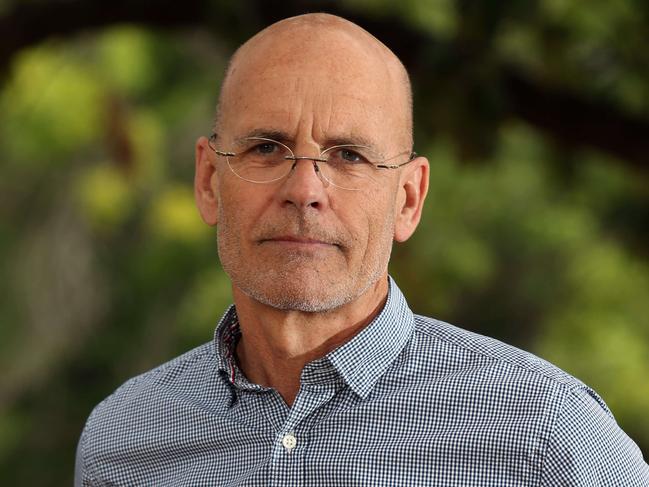
If correct, Prof Hamilton’s prediction could prove economically damaging for Australia.
Hong Kong was Australia’s twelfth-largest trading partner in 2017, with a two-way trade valued at $18.8 billion.
The Australian-Hong Kong Free Trade Agreement, signed in March, was hailed by Prime Minister Scott Morrison as a “big win” that he said would provide certainty for “Australian farmers, businesses, service suppliers and investors”.
But Adam Ni, a China researcher at Macquarie University, said the unrest was providing massive uncertainty for big business.
“Any escalation of the current crisis will have a long-term impact on Hong Kong’s reputation as an economic hub,” he said.
“It will be a place that’s seen as less stable and more prone to these movements.”
Mr Ni said he did not possess a crystal ball, but “right now there is a lot of cause to be worried about the trajectory about where (Hong Kong is) heading. The Communist Party is on a path to a showdown with the protesters.”
OPINION: China will be Morrison’s greatest leadership test
Jacinta Reddan, Chief Executive of the Australian Chamber of Commerce in Hong Kong (Australia’s largest offshore Chamber of Commerce) told News Corp that Hong Kong’s reputation had already been damaged, which would “make it harder for our businesses to attract staff internationally.
“Members in the hotel and retail sector in particular have been suffering a drop in business due to falling visitor numbers for some weeks but this impact now seems to be spreading to other sectors as the disruption and uncertainty continues,” she said.
“Our members are concerned about the ongoing risk to business and of the impact on their staff, with many reporting a significant staff morale issue. Many businesses are undertaking contingency planning but we are not aware of any member who is specifically planning to leave Hong Kong as a direct result.”
Despite the disruptions, Ms Reddan said, “in true Hong Kong fashion, business continues in many ways, as usual.”
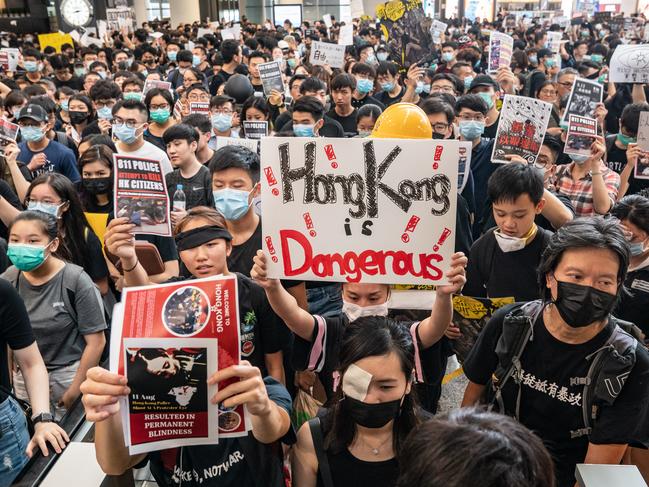
But Prof Hamilton claimed Beijing had also been increasingly “bullying corporates” in recent years.
On Monday, Cathay Pacific’s CEO announced “disciplinary consequences” for airline staff involved in “illegal protests” a day after the Global Times newspaper editorialised on safety issues affecting the airline.
The airline was responding to “a very clear message” from Beijing, Prof Hamilton said.
“Beijing was saying we’ll stop you flying unless you fire any staff who have lent support to the protests in Hong Kong,” he said.
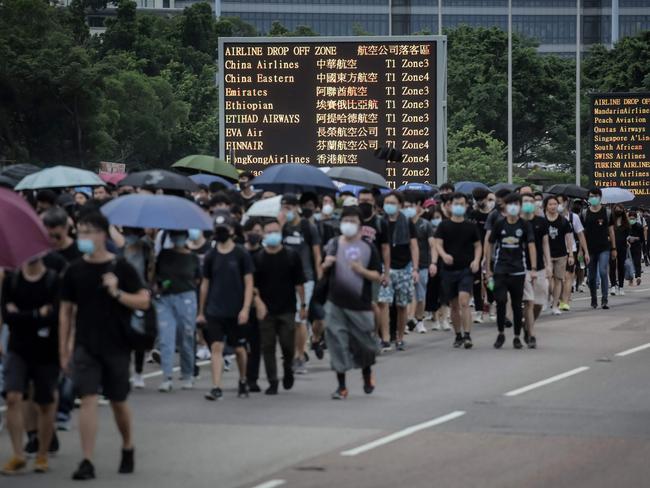
Qantas has also previously been accused of kowtowing to Beijing after it was revealed last year that China had insisted the airline remove any reference to Taiwan as an independent country from its booking systems.
Prof Hamilton said airlines could resist pressure from Beijing if they acted collectively.
“If the airlines agreed that they would not be bullied then Beijing would be forced to back down,” he said.
“It’s divide and conquer. Beijing is very good at that.”
OPINION: Hastie’s warning reveals deep divisons over China
Fashion brands Givenchy, Versace and Coach recently ran afoul of Chinese authorities for similar reasons after social media users lambasted the companies for selling T-shirts which listed Hong Kong, Macau and Taiwan as their own countries.
All three labels delivered quick apologies.
The statement from Coach said there was a “serious inaccuracy” in their T-shirts, and they “deeply regretted” the design.
“What struck me was not so much the T-shirts, it was that they issued the most grovelling apologies, which I’m certain were drafted by the propaganda departments in Beijing,” Prof Hamilton said.
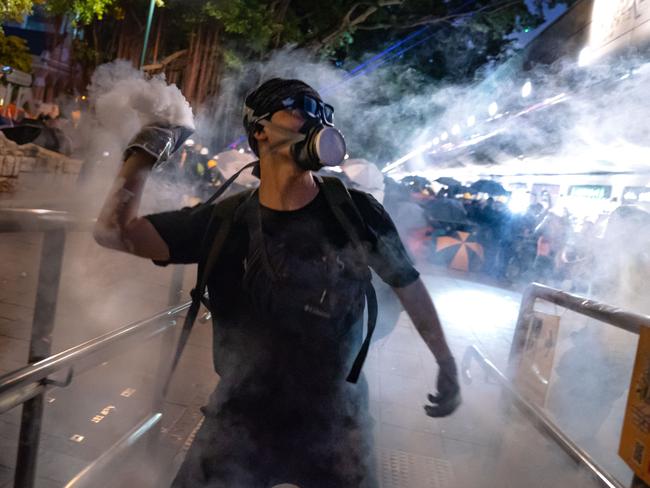
Australian business interests have up to now been somewhat reluctant to discuss the unfolding situation in Hong Kong.
In June, The Australian Chamber of Commerce Hong Kong released a statement calling for the controversial Fugitive Offenders Ordinance - the catalyst for the current protests - to be debated and resolved “in a way that fully respects Hong Kong’s unique position as well as the clearly evident concerns of the broader community about preserving established rights and freedoms.”
The Australian Association of Hong Kong declined to comment for this story, while the Hong Kong Australia Business Association did not respond to repeated requests.
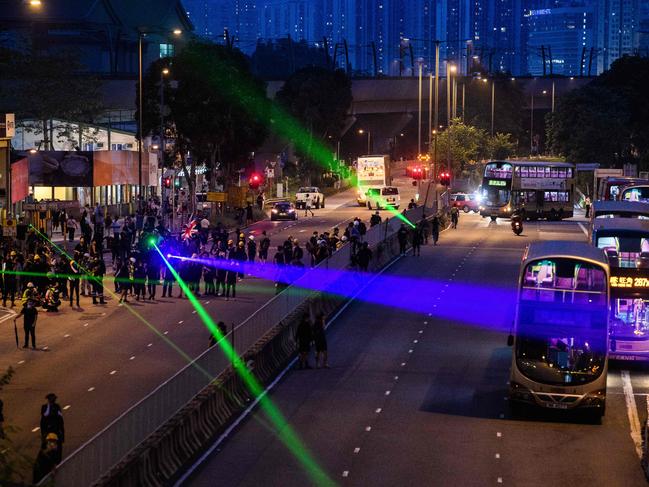
— Additional reporting by AP
Originally published as Hong Kong crackdown could lead to massive population exodus and a big blow for Australian trade, critics say


